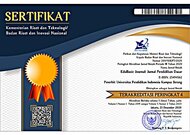Analysis of Metacognitive Approach to The Mathematics Reasoning Ability of Students of State Elementary School of Pamulang 01
Abstract
This research was motivated by students' low mathematical reasoning ability in elementary schools and the demands of numeracy literacy through the minimum competency assessment (AKM) program launched by the government, requiring students to improve their reasoning abilities by applying a metacognitive approach. This study aimed to determine the effectiveness of the metacognitive approach in improving students' mathematical reasoning abilities on the material of the spatial structure. The method used in this study was an experimental research method with a quasi-experimental approach, with a sample size of 59 students (31 students in the control class and 28 students in the experimental class), with a pretest-posttest-only control group design. The results obtained from the calculation of the independent sample t-test revealed a t-count of 0.356, less than a t-table of 2.002. It indicates no difference in students' mathematical reasoning ability between the experimental and control classes. Thus, the metacognitive learning approach did not significantly affect the mathematical reasoning ability of students in sixth grade of State Elementary School of Pamulang 01. In other words, it can be said that the metacognitive learning approach for students at State Elementary School of Pamulang 01 was not appropriate for learning mathematics. The results of this study are expected to be useful to related parties who can use it, such as school principals, teachers, parents, students, and further researchers.
Keywords
Full Text:
PDFReferences
Erlin, E., Rahmat, A., Redjeki, S., & Purwianingsih, W. (2021). Analisis berbagai strategi dan model pembelajaran yang dapat memberdayakan kemampuan metakognitif pada pembelajaran biologi. Bioed: Jurnal Pendidikan Biologi, 9(2), 30–40.
Hadi, S., & Novaliyosi, N. (2019). TIMSS Indonesia (Trends in International Mathematics and Science Study). Prosiding Seminar Nasional al & Call for Papers Program Studi Magister Pendidikan Matematika Universitas Siliwangi 2019, 562–569.
Jankowski, T., & Holas, P. (2014). Metacognitive model of mindfulness. Consciousness and Cognition, 28, 64–80.
Leen, C. C., Hong, H., Kwan, F. N. H., & Ying, T. W. (2014). Creative and critical thinking in Singapore Schools. NIE Working Paper Series, 2, 3–47.
Masrura, S. I. (2013). Faktor-faktor Psikologis yang mempengaruhi kesadaran dan metakognisi dan kaitannya dengan prestasi belajar matematika. MAPAN: Jurnal Matematika dan Pembelajaran, 1(1), 1–19.
Munaji, M., & Setiawahyu, M. I. (2020). Profil kemampuan matematika siswa SMP di Kota Cirebon berdasarkan standar TIMSS. Teorema: Teori dan Riset Matematika, 5(2), 249–262.
Nurfaizah, A. P., Suarlin, S., Amrah, A., & Nurhaedah, N. (2015). The effectiveness of mind mapping model toward students’ creative thinking ability on basic concepts of civics at PGSD FIP UNM. Proceeding of International Conference on Science and Advanced Technology, 4, 752–758.
Nurwidodo, N., Aisyah, D. F. N., & Fauzi, A. (2021). Kesadaran metakognitif siswa setelah mengikuti pembelajaran modifikasi cooperative script dipadu Hybrid-PjBl. JINoP (Jurnal Inovasi Pembelajaran), 7(1), 10–18.
Nuryani, R., Lidinillah, D. A. M., & Mulyana, E. H. (2014). Penggunaan strategi metakognitif untuk meningkatkan self-efikasi siswa sekolah dasar dalam memecahkan masalah matematika. Pedadidaktika, 1(1), 1–9.
Ramdan, M. G. A., & Roesdiana, L. (2022). Analisis kemampuan penalaran matemtis siswa SMP pada materi phytagoras. Jurnal Educatio, 8(1), 386–395.
Redhana, I. W. (2019). Mengembangkan keterampilan abad 21 dalam pembelajaran kimia. Jurnal Inovasi Pendidikan Kimia, 13(1), 2239–2253.
Rosyidah, A. N. K., Umar, U., Nurmawanti, I., Hidayati, V. R., & Maulyda, M. A. (2021). Internalization process of reasoning and proof standards for elementary school teachers in mathematics learning. AKSIOMA: Jurnal Program Studi Pendidikan Matematika, 10(1), 423–434.
Runisah, R., Lestari, W. D., & Siregar, N. (2021). Students’ mathematical reasoning: How could it be through MHM-problem based strategy aided interactive multimedia? AKSIOMA: Jurnal Program Studi Pendidikan Matematika, 10(3), 1477–1492.
Salmina, M., & Nisa, S. K. (2018). Kemampuan penalaran matematis siswa berdasarkan gender pada materi geometri. Numeracy, 5(1), 41–48.
Sembiring, M. B., Octariani, D., & Rambe, I. H. (2021). Pengaruh model pembelajaran problem based learning terhadap kemampuan metakognitif siswa. Journal Mathematics Education Sigma (JMES), 2(1), 36–41.
Setiawan, H., Sa’dijah, C., & Akbar, S. (2017). Pengembangan instrumen asesmen autentik kompetensi pada ranah keterampilan untuk pembelajaran tematik di sekolah dasar. Jurnal Pendidikan: Teori, Penelitian, dan Pengembangan, 2(7), 874–882.
Yusdiana, B. I., & Hidayat, W. (2018). Analisis kemampuan penalaran matematis siswa SMA pada materi limit fungsi. JPMI (Jurnal Pembelajaran Matematika Inovatif), 1(3), 409–414.
Zohar, A. (2012). Explicit teaching of metastrategic knowledge: Definitions, students’ learning, and teachers’ professional development, In A. Zohar & Y. J. Dori (Eds.), Metacognition in Science Education, Trends in Current Research: Contemporary Trends and Issues in Science Education, 40, 197–223.
Zulfikar, R. N. (2019). Analisis strategi metakognitif siswa dalam memecahkan masalah matematika. Jurnal Ilmiah Iqra’, 13(1), 64–71.
DOI: https://doi.org/10.17509/ebj.v4i1.38753
Refbacks
- There are currently no refbacks.
Copyright (c) 2022 Universitas Pendidikan Indonesia
This work is licensed under a Creative Commons Attribution 4.0 International License.
This journal is indexed by




.png)




.png)
1.png)


1.png)

.png)